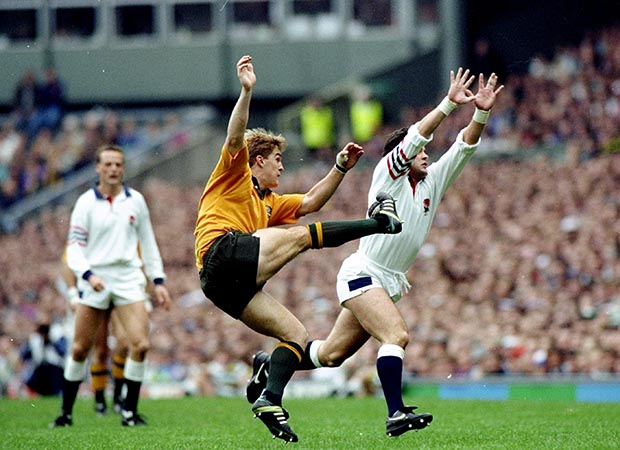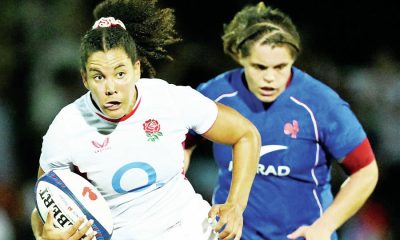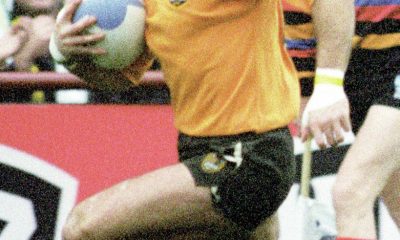

Altitude training helps increase the oxygen-carrying capacity of the blood by boosting the number of red blood cells but that is only a short-term thing, as normal levels return pretty quickly once you get back to sea level.
Altitude training is estimated to provide effective benefits for only up to 14 days and England begin their altitude training extravaganza on July 17 for two weeks.
As the World Cup is not starting until September 18, one has to ask, what is the point in travelling all the way to Colorado for altitude training that will have little or no positive contribution to the overall fitness of the squad?
It will, however, make the players leaner if not meaner and help lower their body fat content as fat burns quicker in low oxygen environments, something I wish I had known back in 1990 when the RFU started doing body-fat testing.
Before the first World Cup in 1987, England training sessions were very similar to what happened at club level, except a bit more intense – but the introduction of Olympic bobsleigh coach Tom McNab changed that. For our first ever foreign training camp in Portugal the RFU kit sponsor Nike, provided us with athletic running gear instead of just the usual pair of rugby boots.
On arrival at our training base in the Algarve, we were instructed to change and make our way to the track where we would begin our first ever ‘athletic’ training session.
When we got to the track complex a number of famous Olympic athletes who were going through their training routines immediately stopped and stared in wonder at this motley group of all shapes and sizes that had appeared among them, wearing running shoes, shorts and vests.
Their stunned silence was replaced with some laughter and curiosity as to who we were and why we were there, at which point Gareth Chilcott suddenly bellowed: “They think we’re athletes!” something we patently were not, which drew more laughter from everybody.
At that camp we were shown how to run properly and more complex training systems like plyometric, interval training, and weight training and introduced to the dreaded bleep test. This was a 20- metre run to be completed between two bleeps sounded in an ever-decreasing time, thus forcing you to run faster and faster the further you ran. In among the track work that included sprints and hurdles, we were sent on a series of cross country runs and played a number of semi opposed games, finishing our time there with a run-out against the Portugal national side.
As with all these things there were also a number of break days where the squad had time off to relax. England’s exit at the quarter-final stage against Wales ensured that training was stepped-up for the next Cup. When McNab was replaced by Rex Hazeldine of Loughborough College, everything took on a new intensity.
Our training sessions became more structured with a number of new disciplines added, plus we were measured for height, weight, body fat, aerobic and anaerobic fitness and dynamic power.
The fitness of the squad was measured in the reducing amount of Vaseline used by the players in a game. This sounds strange but players use Vaseline to stop chaffing between their legs; the fitter we got the less our legs rubbed, hence less Vaseline was used.
The last off-shore training camp before the ’91 World Cup was at Club la Santa, in Lanzarote, where the squad were put through their paces sharing the facilities with some of the biggest names in athletics at the time.
Two time Commonwealth Games gold medallist, Jamaican sprinter Merlene Ottey, was roomed behind the accommodation I shared with John Olver and Mark Linnett. Although these training camps were vital to the fitness of the squad, they also helped with the bonding of new players in the squad during the off-field R&R time.
One of my fondest memories of the trip was sitting at the bar one evening with the rest of the squad when Mark appeared wearing Merlene’s lycra running suit and ran around the bar. He had spotted it on her washing line and tried it on, needless to say the nine stone sprinter Ottey never fitted the suit in the same way as the 17st prop Linnett!
That was the night that Mick Skinner and Mike Teague disappeared into the night not to return until the following afternoon.
When berated by team manager Geoff Cooke and told that if he had another blindside flanker in the squad both would have been sent home, what was their excuse? Cooke was stunned when Teague replied: “It’s all right Geoff, we’re on a mission from God.”
That mission ended in a second place finish to Australia in the Twickenham final. Lancaster will be hoping that by going quite a bit further so will his team.

2 Comments
You must be logged in to post a comment Login
Leave a Reply
Cancel reply
Leave a Reply
You must be logged in to post a comment.































Pingback: power wheels jep
Pingback: โปรโมชั่น LSM99